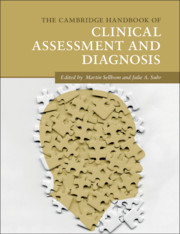Book contents
- The Cambridge Handbook of Clinical Assessment and Diagnosis
- The Cambridge Handbook of Clinical Assessment and Diagnosis
- Copyright page
- Contents
- Figures
- Tables
- Contributors
- Acknowledgments
- 1 Introduction to the Handbook of Clinical Assessment and Diagnosis
- Part I General Issues in Clinical Assessment and Diagnosis
- 2 Psychometrics and Psychological Assessment
- 3 Multicultural Issues in Clinical Psychological Assessment
- 4 Ethical and Professional Issues in Assessment
- 5 Contemporary Psychopathology Diagnosis
- 6 Assessment of Noncredible Reporting and Responding
- 7 Technological Advances in Clinical Assessment
- 8 Psychological Assessment as Treatment
- 9 Writing a Psychological Report Using Evidence-Based Psychological Assessment Methods
- Part II Specific Clinical Assessment Methods
- Part III Assessment and Diagnosis of Specific Mental Disorders
- Part IV Clinical Assessment in Specific Settings
- Index
- References
9 - Writing a Psychological Report Using Evidence-Based Psychological Assessment Methods
from Part I - General Issues in Clinical Assessment and Diagnosis
Published online by Cambridge University Press: 06 December 2019
- The Cambridge Handbook of Clinical Assessment and Diagnosis
- The Cambridge Handbook of Clinical Assessment and Diagnosis
- Copyright page
- Contents
- Figures
- Tables
- Contributors
- Acknowledgments
- 1 Introduction to the Handbook of Clinical Assessment and Diagnosis
- Part I General Issues in Clinical Assessment and Diagnosis
- 2 Psychometrics and Psychological Assessment
- 3 Multicultural Issues in Clinical Psychological Assessment
- 4 Ethical and Professional Issues in Assessment
- 5 Contemporary Psychopathology Diagnosis
- 6 Assessment of Noncredible Reporting and Responding
- 7 Technological Advances in Clinical Assessment
- 8 Psychological Assessment as Treatment
- 9 Writing a Psychological Report Using Evidence-Based Psychological Assessment Methods
- Part II Specific Clinical Assessment Methods
- Part III Assessment and Diagnosis of Specific Mental Disorders
- Part IV Clinical Assessment in Specific Settings
- Index
- References
Summary
Psychological assessment and report writing are arguably two of the more important tasks of clinical psychologists. The overall purpose of this chapter is to provide some recommendations and guidelines on how to write a psychological report using evidence-based assessment methods. Principles on psychological report writing derived from seminal papers in the field of psychological assessment were adapted and used as an organizing tool to create a template on how to write all varieties of psychological reports that incorporate evidence-based assessment methods. Report writers who share similar approaches to evidence-based assessment methods may find this template helpful when formatting their psychological reports.
Keywords
- Type
- Chapter
- Information
- The Cambridge Handbook of Clinical Assessment and Diagnosis , pp. 101 - 110Publisher: Cambridge University PressPrint publication year: 2019

